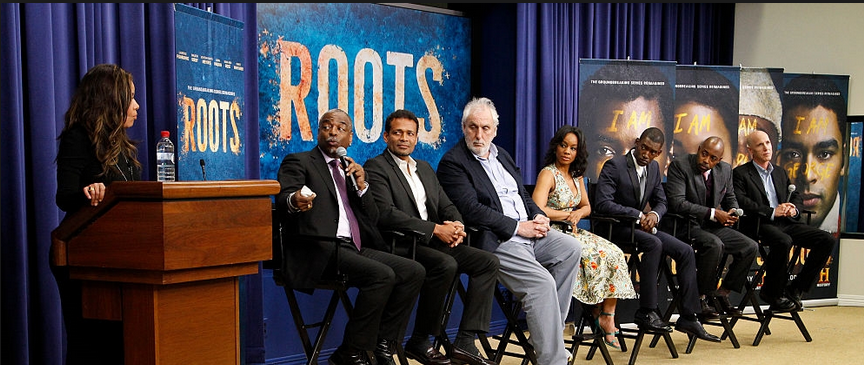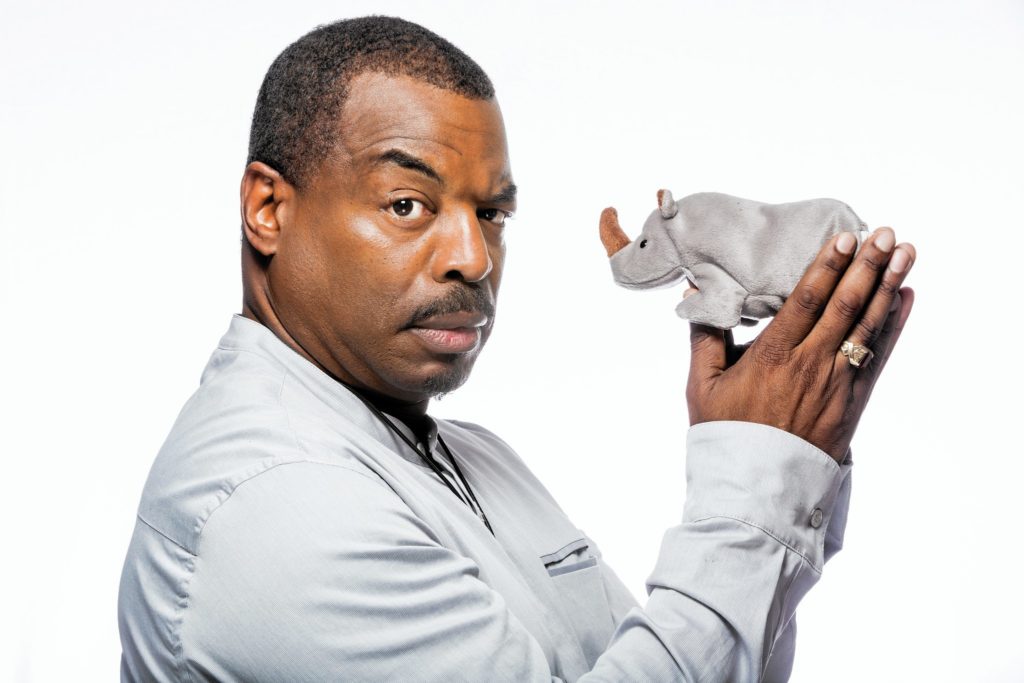Careers: Interview with Roots producer LeVar Burton (who played Kunta Kinte)

Q&A with Roots producers LeVar Burton (who played the original Kunta Kinte and is now back in a producing role) and Mark Wolper.

Q: Why is it after so many years, why is this the right time to make Roots?
LeVar Burton: Human beings have very short memories, and they say about history that those who forget the past are condemned to repeat it. This is a story that is part and parcel of the civilisation of this planet. As such, it’s a story that we need to retain in our very souls, so that we do not repeat the horrors, the atrocities of a slave trade… There is slavery going on, on this planet, as we speak, and unless good people of conscience stand up and tell these stories, there’ll be more.
Q: It’s so interesting that you talk about the history and repeating the history. You are here, living history. You probably, among us here, probably have a longer involvement with Roots than anyone. You’ve lived, you know, your adult life, in many ways, with another identity that’s called Kunta. So, what is that like? You know, what has it been, living your adult life and now returning to Roots as a producer? What has that experience been like for you?
LeVar Burton: Well, Roots was my first job. In fact, it was my first professional audition. I was 19, and it changed my life. It gave me the life that I enjoy now. Coming back to this project again, 40 years later, is really extraordinary. I used to think that life was very much a linear journey, but this experience has really shown me that it’s really circular in nature. I’ve come back to this same place, with this same project, but with a whole new cast of characters, both in front of and behind the camera. Even though the story is intimately familiar to me, it feels very different, very different.
Q: So, you’re now with our new-vision Roots. You’re a producer, your first assignment, “Go find Kunta Kinte.” Tell us about that experience.
LeVar Burton: The movie doesn’t work without Kunta, especially the first night. You have to get the audience connected, and it’s through this character of Kunta Kinte that the audience is really drawn into this story. If you don’t form an emotional attachment with Kunta, you won’t pay attention, you won’t tune in for the other hours. There was an exhaustive search: Several continents, several months. New York, London, Los Angeles, all over the world we looked, and we found the right actor in Malachi Kirby.
Q: Mark Wolper, you’ve lived with it for a long, you waited until this moment to make it, to fulfil your vision. We’re now about to premiere it for an international audience. What do they need to know, or what should they consider in preparing themselves to experience your vision for Roots?
Mark Wolper: Well, this is, sort of, my Roots. It’s been a burden, the decision to even contemplate doing this again. I was afraid to try to do, first of all, what my father had done, to walk in the shadow or footsteps of my father. Also, to try to create a project that has such global impact as the first Roots did. It was a supremely frightening proposition, and so I resisted, for many, many years, doing it, in spite of very smart programmers coming and saying, “Please, we need to do Roots again,” I resisted it and consistently said ‘no’.
It wasn’t until about four years ago, that I sat my 16-year-old son down to watch the original Roots that his grandfather did. He couldn’t watch it. I had to physically force him to sit down in there, to watch it. Why? Because he said, “Dad, I understand why it’s important to you, but like your music, it doesn’t speak to me.” It was in that moment that I realised why I have to get over my fear and try to tell the story again. There’s a whole new generation, a whole new group of people around this world that don’t know the story, that didn’t see the story, and need to see the story, because these people that they’re talking about right here are real people. They’re not talking about characters. Kizzy existed, Tom Lea existed. We have photographs of her son. These are real people, this is a real history that we need to tell the story again, and I have an obligation foremost to have made this Roots for my 16-year-old son, so that he’ll sit down, and look at it, and have the same experience I had when I saw my father’s Roots.

Q: I believe there were some wonderful creative choices made in making this new vision that are unique to the miniseries as an art form. Can you tell us what you’ve done that is so unique?
Mark Wolper: I had to try to make it better than the first one. Fortunately, I knew that I had to find, obviously, the right partner, or, to be honest with you, someone that was going to give me all the tools that I needed to make it. By the way, yes, that does equal money. That’s an important part of the filmmaking process, but the History Channel and A&E Studios really did convince me, and, subsequently, did give us all the tools that we needed to tell this story the right way, to make it better than the first one. ‘Better’ means a lot of things. Yes, it is technically better, and that’s something that my son will respond to as seeing it in, sort of, the way that television dramas now as so powerful. Also, we were able to tell history better than Alex Haley told it the first time. Alex became a grandfather and was around my whole life, and he wrote of what he knew at the time. We have now been able to demonstrate in this miniseries what he didn’t know, and the facts that he couldn’t get because the times were different.
The popularity and the success of the book and the original miniseries prompted enormous archaeological, sociological studies, academic study of the slave trade, of Africa, of Jufureh, of what happened in America. We’re now lucky enough, we had approximately 16 historians of various expertise that were on a board for us, working for us through the entire process. We can now demonstrate this all in a way that Alex never could have dreamed could have happened, and speak to the truth of that history. Also, be able to tell it in a supremely entertaining way.
The power, the intensity, the drama of what you’re going to see, specifically tonight, when I refer to drama, each night of this miniseries is very different than the other. It is not a series where each episode has the same feel, the same look. Yes, we tell the same story, but we have four distinct, different directors that made four completely different movies. We did not share with them a photographic style, even the titles are different. The music is different. We had each filmmaker approach their film through the eyes of the character that is a central piece of each two hour episode.




